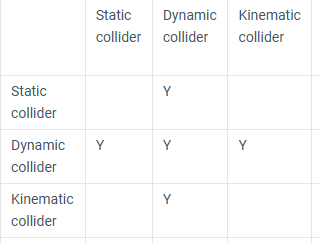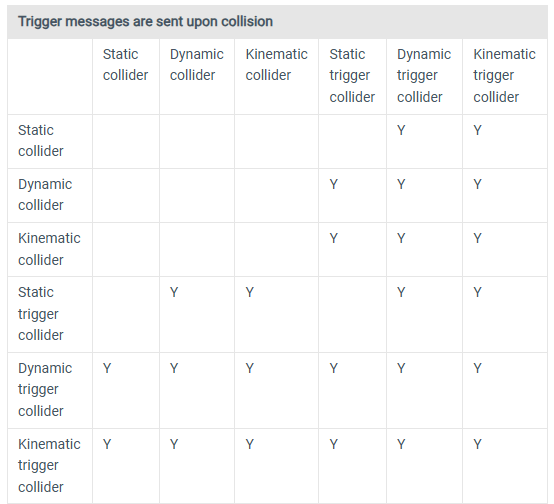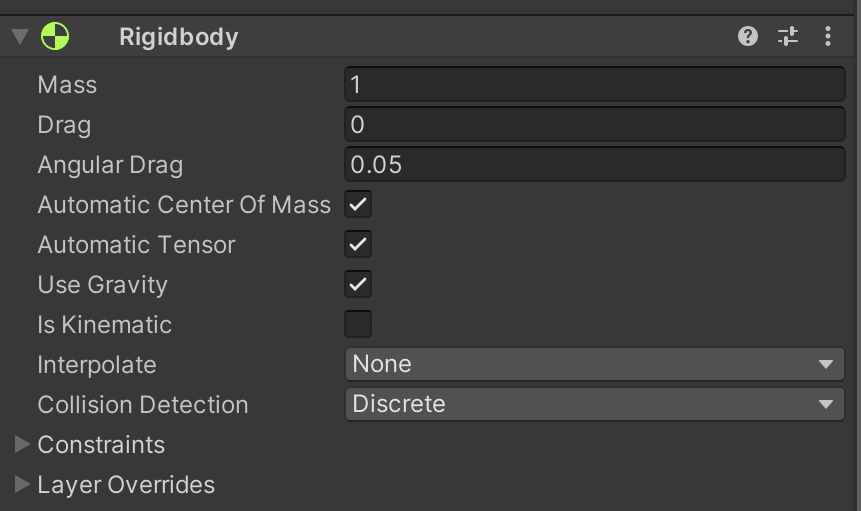- Related: Triggers
Colliders
component that defines the shape of an object for the purposes of physical collisions https://docs.unity3d.com/ScriptReference/Collider.html
private void OnCollisionEnter(Collision other)
{
Debug.Log("Bumped!");
//component name in <>
GetComponent<MeshRenderer>().material.color = Color.yellow;
}
// other functions
OnCollisionStay()
OnCollisionExit()- Lots of colliders
- Rigidbody is needed to be able to bump
- Not all components need Rigidbody (ex. if there is a ball and a wall, only the ball can have rigidbody)
- Rigidbody is needed to be able to bump
- It’s a good idea to freeze components too so that it doesn’t do crazy stuff
- Freeze Position:
Y(you don’t want it flying) - Freeze Rotation:
X,Y,Z(you don’t want player to rotate at all)
- Freeze Position:
OnCollisionEnteris a callback (used when 2 colliders collide)- sphere, capsule, box
- For more complex objects
- combine several primitive colliders to different parts of the game object
- mesh collider (often gets too detailed, impacting efficiency)
- combine shaders AND use mesh collider
Collision detection messages
https://docs.unity3d.com/Manual/collider-types-interaction.html When a pair of colliders make contact, they generate collision detection msgs if the following are both true:
- There is at least one dynamic collider.
- The other collider is a static collider, a kinematic collider, or another dynamic collider.

- static collider = collider
- dynamic collider = collider + rigidbody
- kinematic collider = collider + (is kinematic option) rigidbody
Collision generates trigger messages
Trigger messages occur in the following circumstances:
- A dynamic or kinematic trigger collider collides with any collider type.
- A static trigger collider collides with any dynamic or Kinematic collider.

- So you can just make your ship have a dymanic trigger collider (doesn’t matter if its kinematic or not) so it can collide with everything lol
Making a collider into a trigger
- We make a collider into a trigger by checking
isTrigger - Objects can pass through the collider and can be detected through code
- Make your trigger objects static
OnTriggerEnter(Collider other)
OnTriggerStay(Collider other)
OnTriggerExit(Collider other)Sample script
using UnityEngine;
// on the player ship
public class CollisionHandler : MonoBehaviour
{
// Start is called before the first frame update
void OnCollisionEnter(Collision other)
{
Debug.Log(this.name + " -- collided with -- " + other.gameObject.name);
}
void OnTriggerEnter(Collider other)
{
// OnTriggerEnter
// String interpolation
Debug.Log($"{this.name} ** triggered by ** {other.gameObject.name}");
}
}- For Argon Assault, put the rididbody and collider on the ship, and just put the colliders on the obstacles/enemies!
Rigidbody
component that gives an object the ability to move, fall, or be affected by physics (like gravity, forces, and collisions).
- Adding a rigidbody to an object enables Unity’s physics engine to control the movement and collisions of that object.
- Without a rigidbody, an object will stay where it is, even if you apply forces or try to simulate gravity.
- As a general rule, moving objects should be rigidbody objects
public Rigidbody rb;
void Start()
{
rb.AddForce
}- must also have collider attached

- Mass: how much force is required to move, stop, or change the motion of that object
- Drag: How quickly it will slow down (air resistance)
- Angular velocity: How quickly it will slow its rotation
- isKinematic: manual scripting (not affected by physics)
Use case
Box falling to ground
- The Box
- the box should have both a collider and a rigidbody if you want it to fall and interact with other objects physically
- The Ground
- the ground only needs a collider, not a rigidbody, because you generally don’t want the ground to move or be affected by gravity
- In Unity, objects without a rigidbody but with a collider are considered static objects, which can be collided with but do not move themselves.